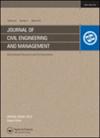重复建设项目的进度安排:结构化文献综述
IF 3.7
3区 工程技术
Q1 ENGINEERING, CIVIL
引用次数: 4
摘要
涉及重复性作业的建设项目通常被称为重复性建设项目。事实证明,与其他行业的项目相比,安排这些项目是一项更加艰巨的任务。典型的优化目标、一组具有特征的约束,以及计划对由实现风险引起的中断传播的易感性,都需要特定的调度方法。通过文献综述,对现有的重复调度方法进行了总结,并对重复调度方法进行了分类,指出了重复调度方法需要改进的方面。这样做是为了指出进一步研究的方向。作者希望本研究能够有助于更好地识别重复性建设项目规划中存在的问题,加快决策支持系统的开发,这是建筑从业者所热切期待的。虽然重点是在建筑项目中的应用,但考虑到不稳定操作条件的重复调度方法可能会引起为其他行业开发规划技术的研究人员的兴趣。本文章由计算机程序翻译,如有差异,请以英文原文为准。
SCHEDULING REPETITIVE CONSTRUCTION PROJECTS: STRUCTURED LITERATURE REVIEW
Construction projects that involve repetitive operations are often referred to as repetitive construction projects. Scheduling them proves a task more demanding than in the case of projects in other industries. Typical objectives of optimization, a characteristic set of constraints, as well as the schedule’s susceptibility to the propagation of disruptions caused by materializing risks, call for specific scheduling methods. The authors review the literature to summarize the existing repetitive scheduling methods and put forward their classification to identify the method’s aspects needing refinement. This is done to point to directions of further research. The authors hope that this study will contribute to better identification of existing problems in planning repetitive construction projects and faster development of decision support systems, eagerly anticipated by the construction practitioners. Though the focus is on applications to construction projects, the repetitive scheduling methods that account for volatile operating conditions may be of interest to researchers who develop planning techniques for other industries.
求助全文
通过发布文献求助,成功后即可免费获取论文全文。
去求助
来源期刊

Journal of Civil Engineering and Management
ENGINEERING, CIVIL-
CiteScore
6.70
自引率
4.70%
发文量
0
审稿时长
1.7 months
期刊介绍:
The Journal of Civil Engineering and Management is a peer-reviewed journal that provides an international forum for the dissemination of the latest original research, achievements and developments. We publish for researchers, designers, users and manufacturers in the different fields of civil engineering and management.
The journal publishes original articles that present new information and reviews. Our objective is to provide essential information and new ideas to help improve civil engineering competency, efficiency and productivity in world markets.
The Journal of Civil Engineering and Management publishes articles in the following fields:
building materials and structures,
structural mechanics and physics,
geotechnical engineering,
road and bridge engineering,
urban engineering and economy,
constructions technology, economy and management,
information technologies in construction,
fire protection, thermoinsulation and renovation of buildings,
labour safety in construction.
 求助内容:
求助内容: 应助结果提醒方式:
应助结果提醒方式:


